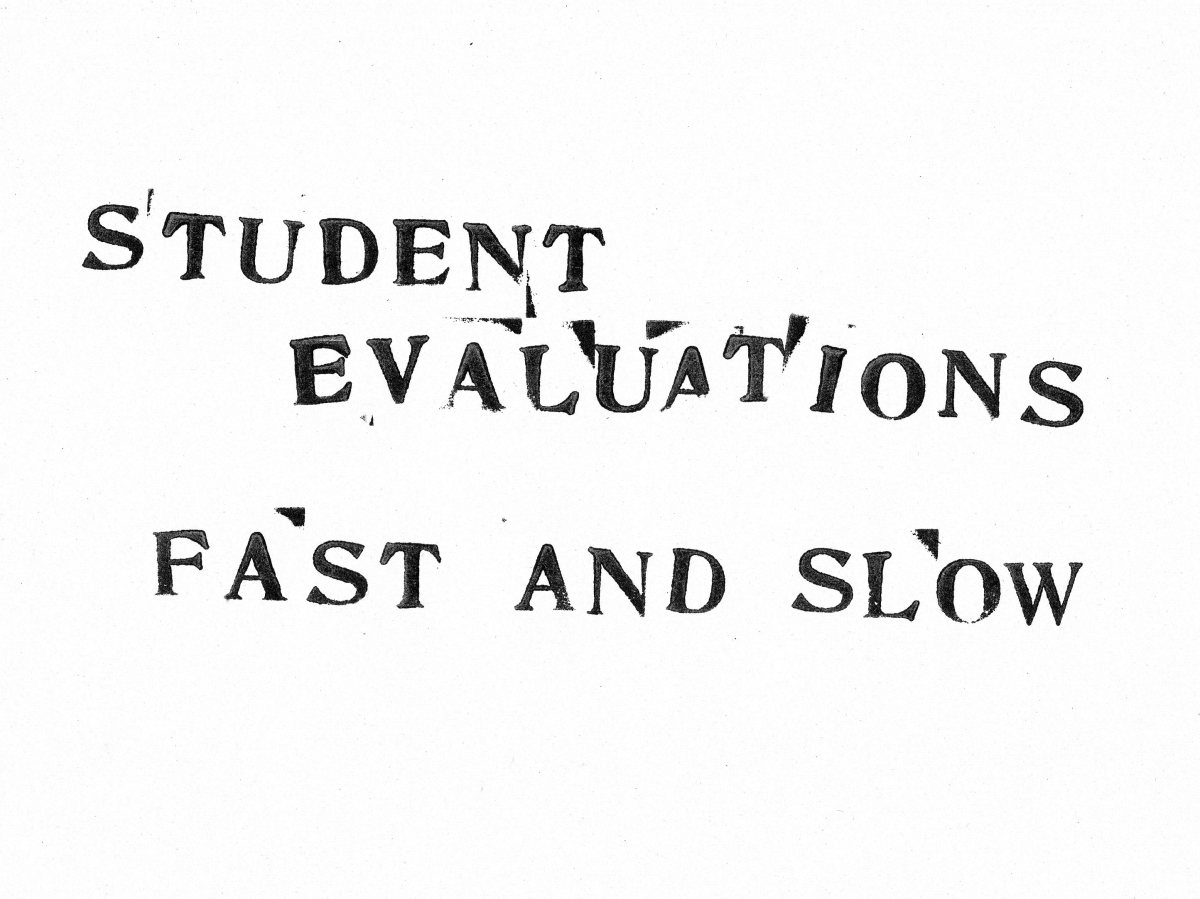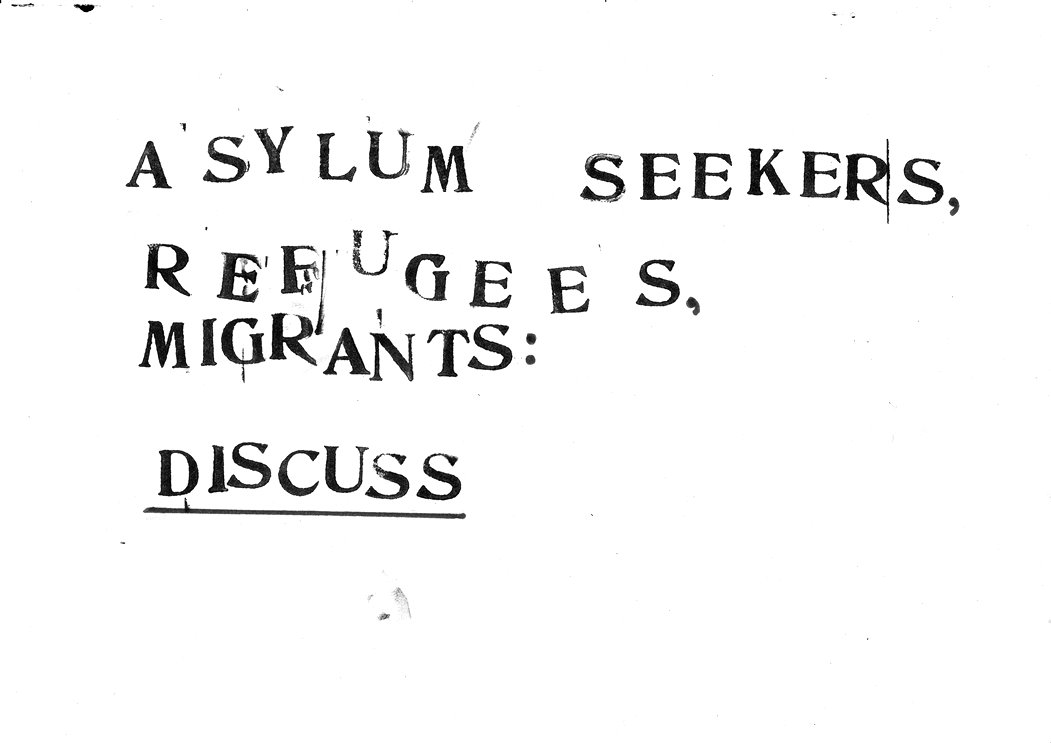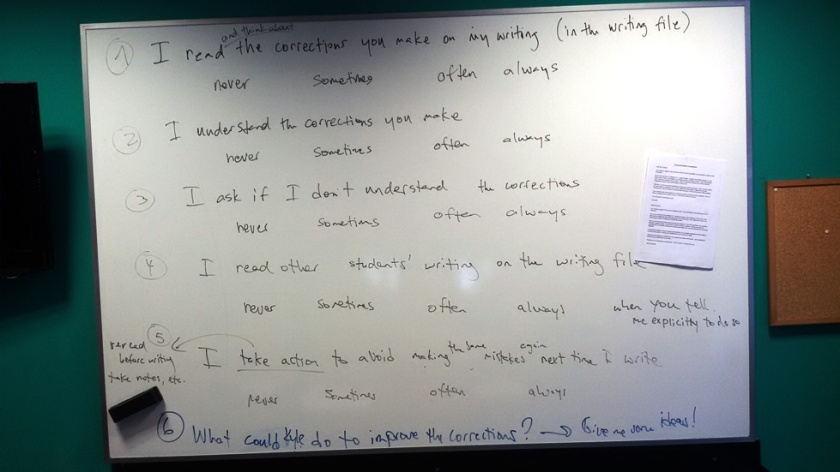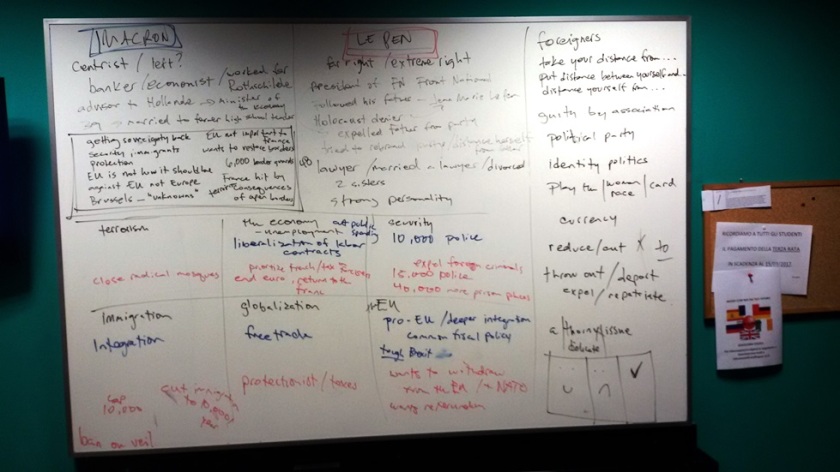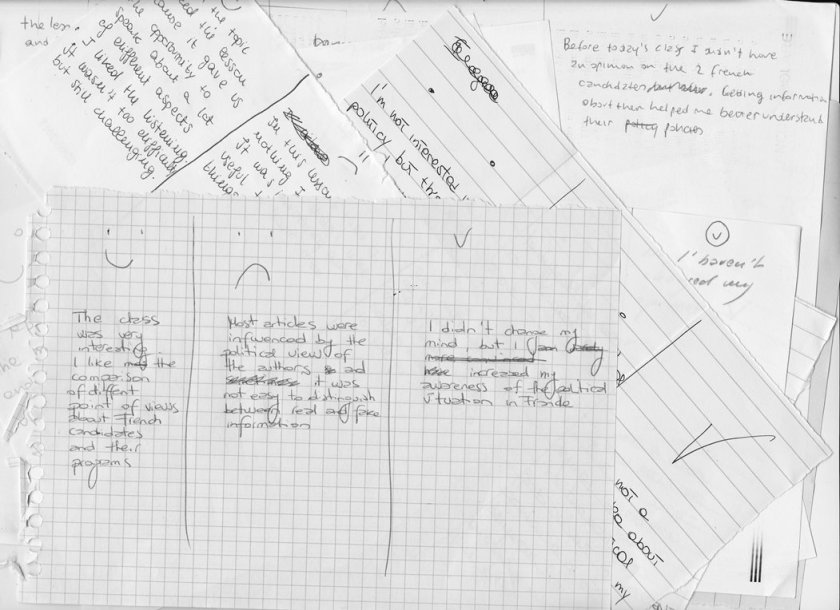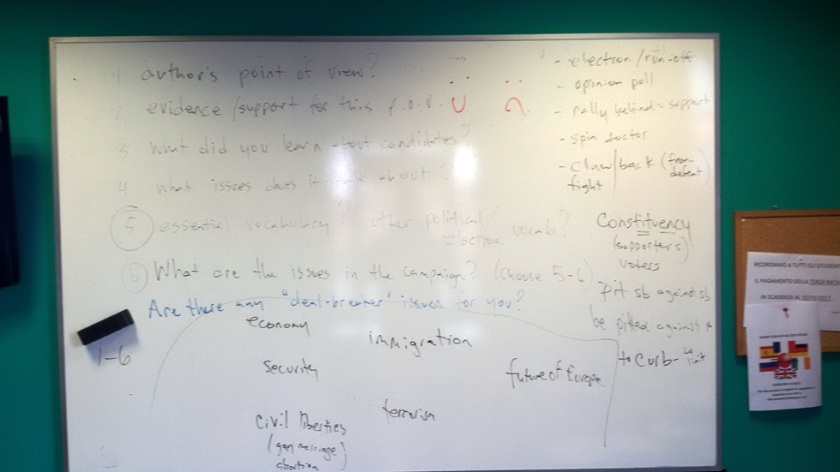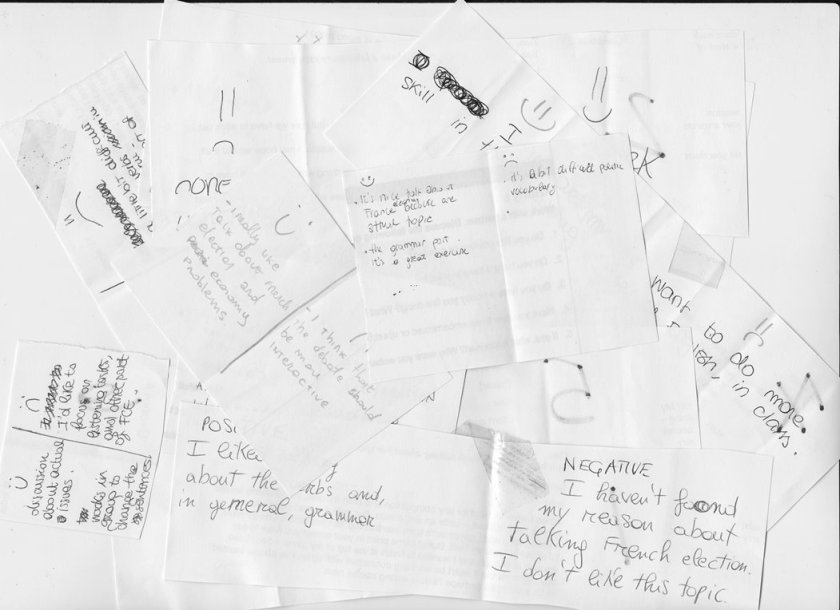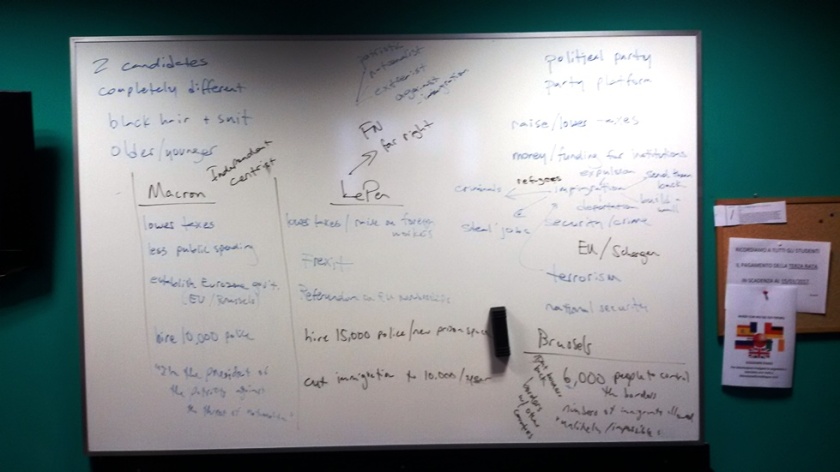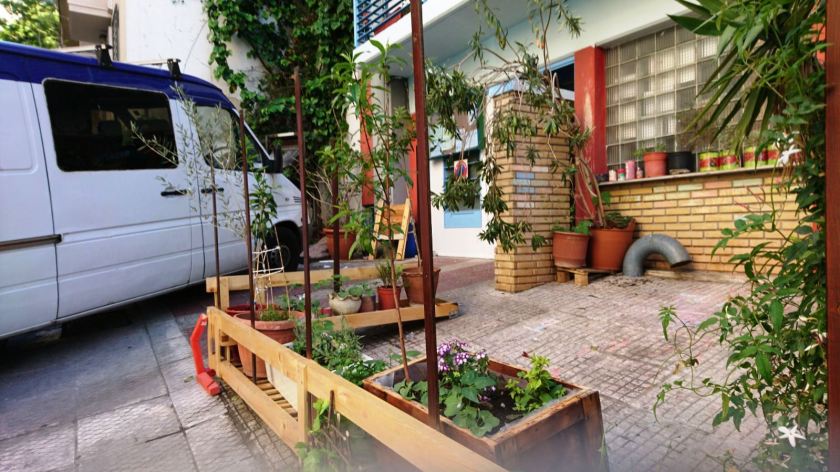Ok, ok, so you’re all on to new conferences with (hopefully) new issues and angles and presentations, but before the dust settles entirely on IATEFL 2017 I’d like to take one last look at the Big Issues that emerged for me from the conference.
For this third and last installment I’m going to throw together talks by Steve Brown, Elaine Hodgson & Viviane Kirmeliene, JJ Wilson, Judy Boyle, and Katy Muench (winner of the IATEFL Gill Sturtridge First Time Speaker scholarship), all of which centered on the extent to which we as teachers have the right and responsibility to discuss, debate and educate students about global issues and issues of social justice, many of which overlap considerably with topics that are considered taboo in the English classroom (the so-called PARSNIPs issues of Politics, Alcohol, Religion, Sex, Narcotics, –isms and Pork).
And like all the presenters, I’m going to throw in a little disclaimer:
You know your teaching context better than me, and it’s naive and silly to assume that what’s possible for me is possible ― or even desirable ― for you. If talking about topic X puts your job, legal status or life in danger then I’m by no means insisting that you should.
But one of the best things about IATEFL for me ― thanks in no small part to the speakers I’m going to discuss ― was that it made me stop to consider the different rights, duties and privileges that you may have as an English teacher in different contexts, whether your students are children or adults, in state schools, universities or private language institutions, where you’re a native, a linguistically-integrated foreigner, or newly arrived expat, teaching where students are customers, where you’re seen as an educator, a professional, or “just a language teacher”, where students have choice, where students all speak the same language, are foreign guests or on their home turf, where there is political violence or the threat of it or where you have no job security or official legal status.
These factors and others may stymie any attempt to bring the real, challenging and often ugly world into your classroom; but equally they might make it not just a choice, but an imperative.
3 ways teachers approach controversial topics in the ELT classroom
First I want to look at 3 ways that emerged from the talks of how we try (or are forced) to deal with controversy in the classroom. They’re not mutually exclusive, but overlapping.
Then I’m going to look at some reasons why we don’t (and it’s not just “because coursebooks” ― but if you want a taste of that argument in the form of a coursebook beatdown see Scott Thornbury, Geoff Jordan, Paul Walsh and many others). Finally, I’ll report on and make some suggestions for how we can approach controversial topics in the ELT classroom.
1. It’s not in the lesson plan!
The first is the in-the-moment response to a student saying something controversial or potentially offensive in class. It’s what Steve Brown called the Can of Worms: you’ve got a split second to decide whether you open it or not. (Note, the issue never seemed to be one student turning on another and directly insulting him or her; rather it’s one student saying something offensive to a certain group)
Brown had a list of “stuff you hope your students don’t say in class,” and in Katy Muench’s presentation she asked us to discuss how we’d respond to a student saying, “Nelson Mandela was a [n-word]. Ha, ha.”
What would you do?
I was chatting with Tyson Seburn, who told me he’d just shut it down. Don’t ignore it, but make it clear that the word is not acceptable. You can’t let one student hijack the class with a remark made in ignorance or out of provocation. Russ Mayne seemed to sympathize:
But Steve would argue that it’s a teachable moment. We should use the comment as a springboard asking why the student would say that, what was meant. We have an obligation, as teachers, to not only help the student inquire into the meaning of his or her own statements, word choices and beliefs ― and interrupt whatever lesson we’re supposed to be teaching to do it.
2. It’s Tuesday, so that must mean we’re doing Human Trafficking!
The next way of looking at controversial topics is planning to deal with them as a lesson. Put that wriggling can of worms right on the syllabus. But this approach has real dangers to it that JJ Wilson revealed so perfectly ― and unintentionally.
In a talk that meant to inspire and even equip teachers with activities they could use to get students thinking about social justice issues and give them a voice, in a throwaway line he unintentionally revealed the all-too-familiar approach to serious and controversial topics.
I had an argument with my editor. We wanted to do a lesson about social justice issues….
In other words, a lesson in a unit in one of Wilson’s many authored coursebooks.
I know that unit, or at least many like it. If it’s not a sweat-soaked Chris Martin of Coldplay guiding an ox-drawn plow in a save-the-rainforest photo-op while a bunch of grinning natives gratefully look on (although to be fair, Wilson was arguing with his publisher ― unsuccessfully, I think ― against white savior representations like Martin, Bono and Sting), then it’s that four-page social justice grab-bag that name-checks Women’s Rights, Animal Rights and Equal Rights (but not Gay Rights), shoehorned between the World of Work and the Trouble with Technology.
Anybody who’s ever mocked the arbitrariness of the grammar syllabus (“It’s Tuesday, so that must mean we’re doing the Present Perfect!”) should equally recognize the absurdity of dealing with social justice issues in the same way (“It’s Tuesday, so that must mean we’re doing Human Trafficking!”).
Let’s be honest: school has an amazing ability to suck the life out of the most fascinating topics. At its worst, school ― and by school here I include both the global-market coursebook or the best-intentioned home-made lesson plan ― can turn anything golden it touches, anything fascinating and interesting and shocking and challenging, into the dullest lead.
So any teacher hoping to slot Something Controversial or a Serious Global Issue on the syllabus runs the risk of turning out one hell of a dud.
Just ask the Brazilians.
Survey says…
According to Elaine Hodgson and Viviane Kirmeliene in their presentation on writing coursebooks for the Brazilian market, publishers in Brazil have a fairly free hand when it comes to creating coursebooks. There is no officially-mandated nation-wide curriculum. The one obligatory topic for inclusion is a unit on African and Indigenous people; the other “global issue” commonly included is Global Warming.
When putting together a new coursebook for the Brazilian market they decided to do market research on the actual end-user. Not on the typically-surveyed teachers, but students. The results?
In a politically turbulent time, the kids wanted more politics ― in the coursebook. Global Warming was fine as a topic but, they said, boring and repetitive in coursebook practice. And the one topic they were truly fed up with? “Social Issues”, i.e. the one mandated by the government: African and Indigenous issues.
Given their interest in politics, the students surveyed clearly weren’t put off by serious topics. But they seemed to make clear what every student knows to be true and every teacher can so quickly forget. The most earnest high diving socially-minded lesson plan can produce the biggest flop.
But it doesn’t have to be so bad.
“We want this in our coursebooks”
Katy Muench (who ominously reported that she had toned her own presentation down significantly in light of a fellow teacher’s recent dismissal and deportation) talked of some wonderful attempts she made to challenge her students stereotypes about blacks in Turkey using YouTube videos produced by Ayo and Ebun. The videos feature a presenter of African origin who lives in Istanbul and the purpose is to raise awareness about stereotypes or ignorance or racism about Africa and Africans (by Turks and others). They videos are Buzzfeed-style videos, sometimes serious but more often silly and playful. According to Katy they manage to charm rather than lecture and gently poke fun and provoke thought about serious issues.
The prepared-lesson approach can also take some fascinating guises, as when Steve Brown described using dialogues and roleplays to present and practice language that empowers the immigrants he teaches, as in the example of how to complain to your MP about bad service from the NHS. And it’s one thing to learn some facts about the host government, another to learn how to negotiate its bureaucracies, and still another to question and debate whether those bureaucracies are actually living up to the promises they make ― or whether another system would be better, and how to fight for it.
Judy Boyle’s presentation on her No Project at the Global Issues day was an absolute showstopper: she runs seminars teaching students about the over 45 million people worldwide living in slavery, victims that that are working to produce the chocolate, clothes, gold and other products we covet and consume. Students produce art, dance and write letters (in English) to large local manufacturers that don’t certify their products Fair Trade.
And like those Brazilian kids who recognized that in a time of political turmoil there was a world erupting just outside their classrooms, the Greek and Italian and Bulgarian kids whose eyes were opened to the horror of human slavery told Judy Boyle: “We want this in our coursebooks”.
3. “It isn’t a body of knowledge, it’s an approach”
The third way of looking at controversial topics is, well, an approach ― an approach to your students, to your class, and to yourself as a teacher. “You can’t teach social justice,” JJ Wilson said. “It isn’t a body of knowledge. It’s an approach.” I’m not sure he was quoting Paulo Freire, but it was his best line, and I think, the whole thesis of his talk. And it was equally what Steve Brown was arguing for.
The ability to deal with controversial topics of any kind is not just a matter of reacting to one student’s uncomfortable outburst or slotting a unit into the syllabus, it’s about creating a culture in class that gives students voice and allows for discussion and debate on challenging, discomforting topics.
It’s what JJ Wilson was talking about when he mentioned Augusto Boal’s letting the spectators burst onto the stage. And, although they were never mentioned explicitly, it’s what Neil Postman and Charles Weingartner were talking about when they said (in Teaching as a Subversive Activity) that in school, the medium is the message: you can talk about democracy in class but if your classroom management is a model of totalitarianism it’s only the latter form of government that’s going to make a meaningful impression.
While I sincerely hope that nobody teaching at IATEFL would be guilty of that charge, the idea of a class with students who were empowered to voice their opinions, their concerns, their anger, their feelings with utter frankness may for some seem a long way off.
But trying to achieve that doesn’t mean we abandon our role as teacher. On the contrary, it enhances it. Students come to us — and not just an online conversation bot — because they trust in the idea of having a teacher. And we can use that leverage not just to weigh in on grammatical accuracy but on matters of fact and belief while he help them grapple with difficult topics and come to know their own voice.
What’s stopping us?
It’s time for me to repeat that disclaimer! Assuming that 1) your job, legal status or life is not at risk, and 2) you’re not chained to a single coursebook or curriculum you’ve got to adhere unit by unit, page by page, until the end, what’s stopping you from raising your voice and talking about the big issues so often omitted or pushed aside?
First I’m going to mention what wasn’t talked about, and then I’ll describe Steve Brown’s very compelling argument for why we don’t serve up PARSNIPs in the classroom.
Lack of knowledge
There seems to be an assumption from teachers like Steve Brown, and Judy Boyle that if it weren’t for external constraints (those mentioned above), we’d all be running challenging discussion classes on important issues. (Linda Ruas even asked me, in utter sincerity and without a hint a sarcasm, what would compel anybody to sign up for the Testing and Assessment SIG (as I had, even though I attended the Teacher Development SIG pre-conference event) or any other SIG when there were Global Issues to worry about.)
But even though I might like, share and post articles about the big issues and discuss them with friends I might be seized by massive self-doubt if I tried to bring them up in the classroom. Do I really know what the hell I’m talking about? Particularly if it relates to the country I’m residing in.
And I think many students might be in a similar position. Global issues may be the stuff they read about and watch and talk about with their friends but they fear being exposed as ignorant if they try to talk about it in public.
Lack of time
As everybody who’s ever tried the big lesson on say Terrorism knows, it takes time to prepare. You want to make sure students have equal access to resources to discuss and to have an informed discussion. Otherwise the ones who follow these issues regularly will have more to say and can dominate the discussion. And you want comprehension questions and language work and all the rest of it so you can feel like you’re having a “real lesson”.
And if you’re suffering from the anxiety of getting found out as a know-nothing on the topic, clearly you’re going to need time to read and research before you can confidently pose questions about it.
And of course, there’s always the fear that global issues have a shelf life. As they often say in the world of corporate blogging, your best time and money investment is in “evergreen” content ― stuff that you can publish over and over again. It’s obviously the global coursebook industry’s bread and butter. If you want to plan ripped-from-the-headlines lessons, you’re talking about a lot of investment for a single lesson plan.
Lack of training
But Steve Brown argued that more than anything it was the lack of training that kept PARSNIPs off our classroom plate.
Steve surely relishes his daily Can of Worms, but why don’t I (and probably many of you)?
Because I’ve done a TEFL Certificate and the first two modules of the Cambridge Delta, and no other formal training in between or after. I was trained to diagram the Present Perfect and say Great! to whatever mumbled half-utterance my students produced. I was trained in the PPP. I was trained to create a mind-numbingly detailed lesson plan and give instructions and create gap fill exercises. I was trained to guide students to discover grammatical rules, but only when I’ve cherry-picked the examples. I’ve been trained in and assessed on what Steve Brown aptly called “low-level skills”.
What I wasn’t trained to do, however, is to actually respond to what goes on in the class. How to assess which avenues, in terms of language or argument, are worth pursuing, regardless of what’s on the plan. I wasn’t trained how to question a student’s beliefs ― not to show off my superior position, or make them reveal their ignorance, but out of personal curiosity and a desire to help them dig deeper into their own preconceptions or system of values. I wasn’t trained how to manage spontaneous debate, or full-class discussion, or moderate heated arguments.
I wasn’t trained for any of that, and outside of Hollywood films I’ve never seen what that looks like in action. Because no one in an observed lesson for any standard teaching diploma scheme is going to risk that kind of thing in the classroom.
So if those are (some of) the problems how can we better, as Linda Ruas put it, let the world into our classroom?
Letting the world into the classroom
Training:
Teacher training should involve more instruction, observation and feedback on how to actually work with the language, and arguments, that come up in class. Do training videos like that exist? I would love to see videos of say Steve Brown teaching some of the classes he describes.
We teach students functional language for debate and disagreement, but do teachers learn the language for moderating one? We’ve got to have more in our arsenal than “Ok, let’s move on”, and we can’t just assume it will come naturally to everybody.
Maybe we should spend time in training courses watching moderated political debates (from Sunday morning news shows or the like) or chaired panel discussions or how-to-negotiate seminars and see apply those principles to the classroom. I’m not being facetious. There are methods and professionals for that kind of thing; it can be taught.
Lessons:
The news is out there. Your students are probably watching and listening to it. So just jump in next time something comes up. I remember one particularly “successful” moment with this approach when news broke of the Charlie Hebdo massacre in Paris. In class that very afternoon we compiled information about what we knew and then turned the debate to the wider (and even by then, longstanding) issue of freedom of speech and its (possible) limits in relation to the infamous Dutch cartoons. For homework and in the following week we continued to discuss and debate the issue while using BBC Radio news clips and reading for more language (and content) input.
Fresher news, however terrible, might work well in a group because no one person is much more informed than the others. And the old authentic materials dictum to “grade the task, not the text” is never more apt ― to save time, grab hold of one useful audio or video clip and see how much mileage you can get out of it in multiple classes.
Of course, the shelf-life issue may be less true than we think. The Syrian civil war is still going on. Refugees and migrants are still fighting to get out of their countries and into Europe and the US (among other places). The economic crisis, the rise of reactionary politics and the possible dissolution of Europe have been front page news for at least as long as I’ve been in Italy (since 2008).
The details of any particular news cycle may change, but the issues, problems and values that are to be debated have not. Investing the time into building a particular lesson around any one of these issues may be time very well spent in that you can go back to it with multiple groups and multiple terms.
And if you’re not sure where to start in terms of some perennial controversial issues, some clever and generous ELT teachers have put together a series of free ebooks with PARSNIP-focused lessons that might be worth checking out.
Processes:
Student selected topics
But I think the most important way to bring the real world in is empowering students to do it themselves. Because as with the Brazilian high school students I mentioned above, social justice issues we serve up to our students in tidy packages are most likely to be the ones they resent the most or find the most tedious.
So I think we need to get the topics to come from our students. That might simply mean asking students to find an article of their individual choice on a controversial topic. Give them some language-oriented follow-up tasks ― and see what they come up with.
But if you’re asking them to vote as a class on a topic, you might need to get them to dig deeper. It’s not enough to turn the tables on the students and say, “What do you want to talk about for the rest of the year?” Believe me, I’ve tried.
About 5 years back, fresh from having read the description in Luke Meddings and Scott Thornbury’s Teaching Unplugged of a teacher in Ukraine whose formerly “inert” students produced their own “Alternate Textbooks” with topics like Human Rights, AIDS and Drug Abuse and the Post WWII World, I asked my own students to come up with a list of topics for the year.
Their answers? Hobbies. Sports. Travel. Work. Fashion. In other words, the table of contents of any coursebook ever published. Where was the crisis? Where was the challenge? Where was the newsworthiness?
In reality, this is another training issue: I had no idea how to coach my students toward whatever real and stimulating topics I had imagined.
These students were interested in and read about world events. The problem was when the question was dumped on their laps they responded in the blandest, and least interesting way possible.
You might have to overcome the unspoken classroom bias against controversial topics in class. As Steve Brown talked about, the silent omission of such topics from any syllabus or classroom they’ve ever encountered might have long ago convinced them it just wasn’t appropriate. Finding out what was on the news last night, or what news stories they read or heard about on social networks, might be a jumping off point.
Overcoming the burden of expertise
Which leads to the last point. By making them part of the process of choosing and selecting topics, you’re encouraging your students to use their voices. But best of all, you’re taking the burden of expertise off yourself.
If “Today we’re doing Global Warming” then you’re expected to have one ace, student-proof lesson plan to back it up. But when your students select the topic for you, you can confess your ignorance, and ask them to teach you everything they know. Be what Paulo Freire called “co-learners” in the classroom.
You can still be the language authority, of course, but you can relinquish your role as subject authority.
Routines and mechanisms
And lastly I think we need to have routines, activities and mechanisms that allow this to perpetuate itself. That means being practiced at setting up impromptu debates. Pop-up debates. Just-a-minute style talks. These are all formats that, like a professional panel discussion or political talk show, in theory encourage a level playing field to speak and be challenged.
But there’s more: in his recent blog post on challenging confirmation bias, AnthonyTeacher reports that in terms of actually challenging student beliefs, “debates and other side-taking activities may be counterproductive”, suggesting instead consensus-seeking “cooperative critical discussion of evidence to reach a mutual conclusion.” (Although I’m still thinking about what this would mean as a practical activity.)
By far one of the best mechanisms I’ve found for level-playing-field discussion is Tyson Seburn’s Academic Reading Circles, which I’ve adopted for the general English classroom (more on that in a coming-soon blog post). It essentially gives individual roles to students that, all together, mimic and train students in the reading processes employed by fluent readers. But what’s great is that it also creates the context for hour-long student-led discussions (as well as intensive language work).
Reading Circles is a great opportunity for reading about challenging, even controversial, topics and giving students a mechanism for discussing them. It levels the playing field (in that students are all working from the same text and have had time to think about how to articulate their opinions). And it relieves the teacher of the burden of subject authority.
Conclusion
If we can talk about controversial topics in the classroom, should we? We might thinking we should avoid politics, but as Steve Brown argued, silence ― omitting those topics from the class, the lesson plan or the syllabus ― is itself a political act.
A classroom is a safe space where students can try out their language and make mistakes without fear of ridicule; it should also be a safe space in which to air views, debate, to challenge and be challenged on the beliefs and issues that outside the classroom may be our most dear ― or dangerous.
Of course, as every presenter intelligently reiterated, you are the best judge of what’s possible in your teaching context.
But just as intelligently, what each presenter was clearly suggesting is that maybe each of us, in our own situation, can do more than we think is possible.

